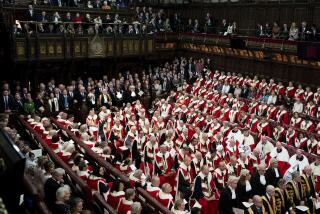Reform Is a Royal Word
- Share via
The British royal family is now involved in a process that could well recapture some of the public support lost in the wake of scandals involving divorce, adultery and other bits of behavior deemed unworthy of a 1,200-year-old monarchy. Reforms are under study and they promise to go a long way toward defending the monarchy against those who call for its demise.
State subsidies to the royal family would be abolished, saving the public $14 million a year. The monarch would no longer serve as the temporal head of the Church of England. An heir to the throne would be allowed to marry a Roman Catholic. And, in the interests of equal rights, the laws of succession would change so that a firstborn daughter could succeed to the throne rather than be obligated to give way to a younger brother.
Why try to modernize now? For one thing, Queen Elizabeth II and the rest of the family have not enjoyed for a second the virtual siege that has accompanied demands for change. The polls have not been good--one showed that only 30% of the queen’s subjects believed the country got “good value” from the royals.
For another, the Labor Party is on the verge of taking power back from the Conservatives, and Tony Blair, the Labor leader, has been under pressure from within his party to take a stand on reforming the monarchy. Hence, presumably, the need for a royal preemptive strike.
Moreover, Prince Charles wants to put things in order to ensure tranquillity after he succeeds his mother, who is now 70. It is Charles, the reports from London say, who is leading the push for radical reform during the family’s discussions.
All of this makes a nice change for the royals. No shock, no dismay, no embarrassments. This time, revelations from within the palace are being warmly welcomed throughout the realm--and with reason.
More to Read
Get the L.A. Times Politics newsletter
Deeply reported insights into legislation, politics and policy from Sacramento, Washington and beyond. In your inbox twice per week.
You may occasionally receive promotional content from the Los Angeles Times.










